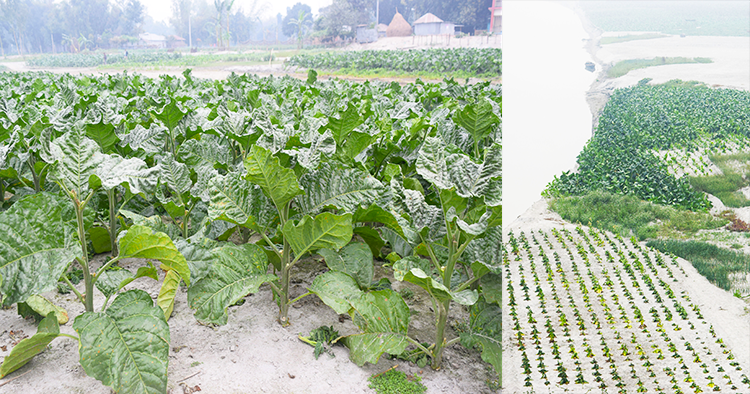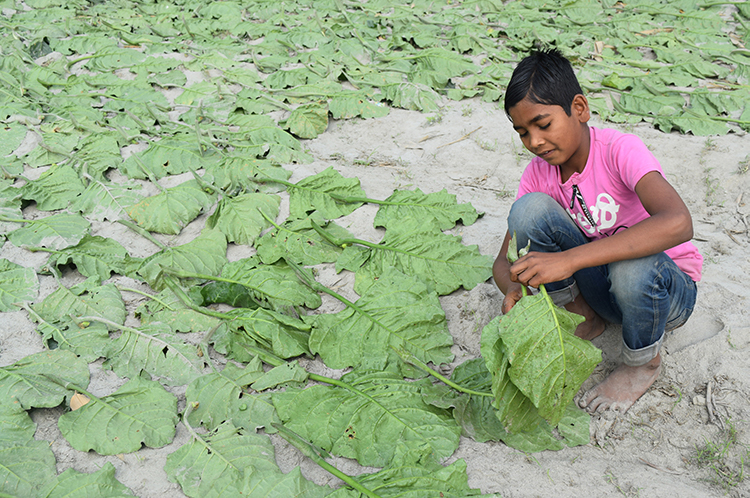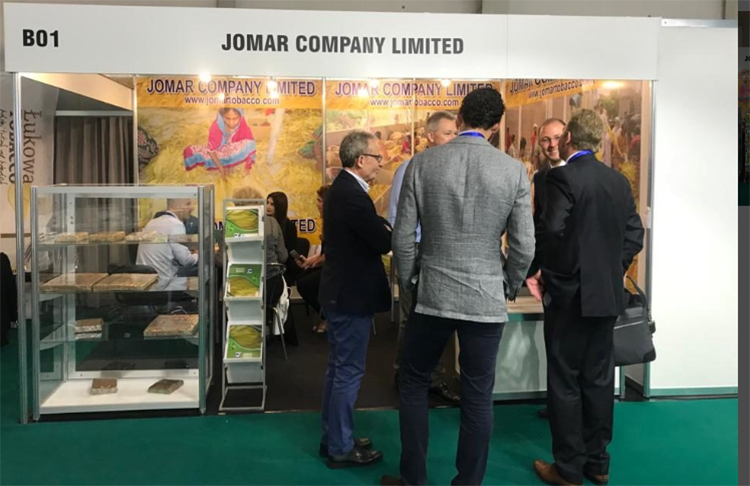
UBINIG
Grown in Bangladesh in north Bengal (along the Teesta river banks) and other districts: 19960 acres (17%) of total cultivation. 12177 mt. tons (14%) of total tobacco leaf production. 12177 mt. tons (14%) of total tobacco leaf production.
Motihari tobacco (Nicotiana-rustica), a Bangladeshi native variety, is cultivated for its chewing quality and high nicotine content. This tobacco nicotine content is highest (4.83-6.64 %) compared to other tobacco cultivated in Bangladesh. Nicotine content in leaf is influenced by various factors such as varieties, fertility status of soil and leaf composition [1] The leaves are heavy & round shaped, dark green coloured as raw leaves, dark blackish when dried.
Sun-cured
After harvesting Motihari tobacco leaves are dried uncovered in the sun from early morning to the evening. Sandy river bank of Teesta is used for putting the leaves on the ground for drying or on ropes for hanging.


Sun dried by on the ground or by hanging
Women, men and children are engaged as unpaid family labour, or as hired labour for drying MOTIHARI leaves.


Women labours receive wages 1.8 – 2.5 USD per day


men receive 3.7- 4.4 USD per day. Children are unpaid family labour
Wholesale market (local) to international destinations

Farmers cultivating Motihari tobacco bring the leaves to the wholesale market. Farmers are basically captive suppliers of the leaves as dictated by the market with companies buying from the wholesalers.
Materials used for producing smokeless tobacco products


Zarda, Sadapata and Gul

Motihari tobacco leaves go to international markets
Motihari tobacco is exported to different countries by Indian and European business portals. Seair Exim data, an Indian company, shows Motihari export to Maldives (2016) by 9600 kgs https://www.seair.co.in/motihari-tobacco-export-data/hs-code-24011090.aspx
Jomar Tobacco Co. Ltd. a constellation maintaining offices in Rangpur, Bangladesh as well as in Madrid, Spain is involved in export of Motihari tobacco leaves; in 2017 the export was 99 MT. It is registered as a tobacco trading firm both in Bangladesh and in the European Union (EU).
Jomar Tobacco uses the facilities of Dhaka Tobacco Industries (presently Japan Tobacco Industries) and Nasir Tobacco for primary processing. Jomar Tobacco deals in Spanish, Italian, Croatian and Romanian tobaccos, including CRES and DIET.
Source: https://www.tobaccoasia.com/features/bangladesh-tobacco-higher-global-visibility/
Jomar tobacco deals with FCV, Burley and other varieties; Motihari is the only variety that is used for chewing tobacco. http://www.jomartobacco.com/our-products/


Conclusion
Like other Tobacco leaf cultivation, Motihari (Nicotiana rustica) is cultivated on the fertile land (including the river banks) using cheap and unpaid family labours consisting of women and children. The harvesting and drying of the leaves involves hard labour with long hours. Women suffer from discrimination in wage payment, health impacts due to working conditions and exposure to nicotine. These remain largely unnoticed by the regulatory authorities. Even under novel corona virus pandemic during March-April, 2020, when the country was under Lockdown, the women had to complete the leaf drying and processing works.
Recommendations
- Tobacco leaf cultivation control must be brought under national policies.
- Use of women and children must follow the national and international laws related to wage discrimination, child labour, health hazards and harmful working conditions
- The involvement of the International tobacco companies and business portals must be made transparent and open and brought under national regulatory authorities.
Reference
Mandi, Sunil. (2017). Empirical model for prediction of motihari tobacco (Nicotiana rustica) leaf quality based on leaf nutrients and soil fertility. International Journal of Current Research. 9. 51001-51005.
This fact sheet was supported by the STOP project, an initiative of the Bloomberg Philanthropies
Produced by UBINIG (Policy Research for Development Alternative), a policy research and campaign organization in Bangladesh. It has worked jointly with TABINAJ – the Alliance of women against Tobacco formed with more than 100 women’s organizations in 64 districts of the country.
Address: Huq Garden, Apt# 4AB, 1 Ring Road, Shaymoli, Dhaka-1207, Bangladesh. Tel: 88-0258155015; e-mail: info@ubinig.org